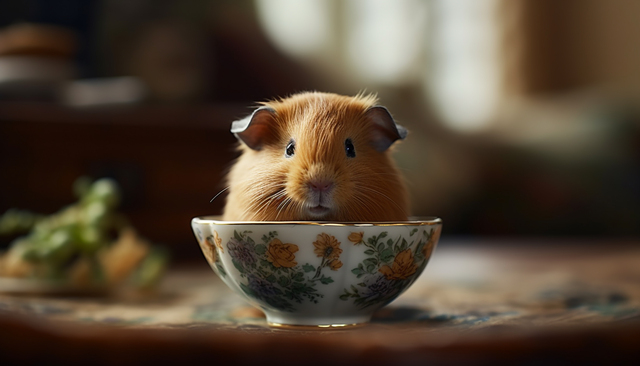Can Guinea Pigs Eat Apples?
Hey fellow guinea pig lover! If you’re like me, you’re always on the hunt for the next best treat for your furry friend. And let’s be real, who doesn’t love a crunchy, juicy apple? But the burning question is: “Can guinea pigs eat apples?”
In this article we dive into how our little pals can indulge, precautions to take, and everything in between.
Introduction to Guinea Pig Diets
You know, guinea pigs aren’t just hay munchers. Their diet is as fascinating as their chirps and wheeks! While the specific breed of guinea pig can have some alterations in diet, guinea pigs all have a general diet to follow:
The Basics of What They Eat
Guinea pigs love their hay, fresh veggies, and pellets. But occasionally, we, the ever-curious owners, wonder: What about fruits? Are they a yay or nay?
Importance of Variation in Diet
Like us diving into a mixed fruit bowl on a summer day, guinea pigs too appreciate variety. It’s not just about taste but also about getting different nutrients.
Delving into Apples as a Treat
Introducing a new treat to your guinea pig’s diet can be both exciting and nerve-wracking. Apples, with their sweet taste and crunchy texture, might seem like a perfect treat, but as with everything, it’s crucial to understand the full picture.
Nutritional Benefits of Apples for Guinea Pigs:
Apples are not just crunchy treats; they offer a host of nutritional benefits:
1) Vitamin C Powerhouse:
Just as oranges are celebrated for their vitamin C content for humans, apples can be a source of this vital nutrient for guinea pigs. Our little furry friends cannot produce vitamin C on their own, making external sources invaluable. An apple a day? Maybe not an entire one, but a slice can surely help!
2) Fiber Boost:
The dietary fiber in apples aids in digestion. This can be beneficial, considering guinea pigs have sensitive digestive systems.
3) Hydration Help:
With a high-water content, apples can assist in keeping your pet hydrated, especially during warmer months. Think of it as a mini-refreshing beverage in solid form.
Risks and Precautions:
However, while apples can be a delightful treat, they come with their own set of cautions. Make sure to be aware of these for both your Guinea pigs health and keeping vet costs down:
1) The Sugar Factor:
Apples, especially the sweeter varieties, have natural sugars. While it might seem healthy, excessive sugar can lead to obesity and other health issues in guinea pigs.
2) Ditch the Seeds:
Apple seeds contain trace amounts of cyanide, which is toxic. Always, and I emphasize always, remove the seeds before offering an apple slice to your guinea pig.
3) Pesticide Alert:
If you’re not offering organic apples, they could have pesticide residues on the skin. It’s always a safe bet to thoroughly wash apples and even consider peeling them.
Serving Suggestions:
To make the apple treat experience delightful for your guinea pig:
Portion Control:
Think of apples as dessert, not the main course. A small, thin slice is more than enough.
Mix and Match:
Apples can be combined with other safe veggies and fruits for a mini fruit salad treat. How about apple, cucumber, and a hint of bell pepper for a gourmet guinea pig delight?
Observation is Key:
Once you’ve introduced apples, keep a keen eye on your guinea pig. Look for signs of happiness, like enthusiastic munching or even wheeking. Also be on the alert for any signs of distress or change in eating habits.
How to Safely Offer Apples
For many of us, feeding our pets is a joyful act. It’s not just about nourishment, but also about bonding. When it comes to guinea pigs, these tiny creatures have a discerning palate and sensitive digestive system. So, if you’re thinking of apples as a treat, here’s how to do it right.
Picking the Perfect Apple:
Organic Over Regular:
If possible, go for organic apples. They’re free from harmful pesticides that might cling to the skin of regular apples. If organic isn’t an option, ensure you wash the apples thoroughly.
Variety Matters:
Guinea pigs, just like us, can have preferences. Some might lean towards the tartness of green apples, while others might love the sweetness of red ones. Experiment with different varieties to find out your pet’s favorite.
Preparation Steps:
1) Washing is Fundamental:
Always wash the apple thoroughly under running water. This helps in removing any residual pesticides or contaminants.
2) Peeling the Apple:
While guinea pigs can eat apple skin, peeling it off reduces the risk associated with pesticides. If you’ve chosen an organic apple, you might leave the skin on, but ensure it’s washed well.
3) No Seeds, Please:
Apple seeds contain cyanide, which is toxic for guinea pigs. It’s crucial to remove the core and seeds. A seedless slice is a safe slice!
4) Slicing Right:
Once the apple is cored and (optionally) peeled, cut it into small, manageable slices or pieces. Think bite-sized; we don’t want our guinea pig struggling with an oversized chunk!
Feeding Guidelines:
Moderation is Key:
While it might be tempting to treat your guinea pig to a big apple feast, especially when they seem to enjoy it, remember: moderation is essential. Offer apples as an occasional treat rather than a regular part of their diet.
Monitoring After Feeding:
After you’ve given your guinea pig apple for the first time, observe them. Watch out for any signs of discomfort, change in bowel movement, or refusal to eat subsequent meals. If you notice anything amiss, consult with a vet.
Storage and Freshness:
Always Fresh:
Offer fresh apple slices to your guinea pig. Avoid giving them anything that’s been sitting out for a while or looks discolored.
Store Leftovers:
If you’ve cut an apple and have leftovers, store them in the refrigerator in an airtight container. This keeps the apple fresh for your next feeding session.
Observing Your Guinea Pig After Feeding
When you introduce a new food to your guinea pig’s diet, there’s more to the process than just watching them enjoy their treat. The aftermath is equally crucial. By observing your guinea pig post-feeding, you ensure their well-being, catch any early signs of discomfort, and learn more about their preferences.
Why It’s Important:
1) Digestive Sensitivities:
Guinea pigs have sensitive digestive systems. What might seem harmless could upset their stomach. Observation helps detect early signs of digestive issues.
2) Allergic Reactions:
Just like humans, guinea pigs can have allergies. Noticing any unusual behavior or physical signs post-feeding can be indicative of an allergic reaction.
3) Preference Learning:
Guinea pigs have personalities and tastes of their own. Observing them can help you understand their likes and dislikes, making future feeding more tailored and enjoyable.
What to Look Out For:
Behavioral Changes:
If your guinea pig is suddenly lethargic, less responsive, or shows signs of distress, it might be due to something they ate. Look for changes in their usual behavior.
Physical Signs:
Drooling, watery eyes, or any signs of discomfort should be noted. Also, check their mouth to ensure no pieces of food are stuck, causing discomfort.
Bowel Movements:
A crucial indicator of a guinea pig’s health is their poop. Changes in consistency, frequency, or color can indicate a problem.
Eating Patterns:
If your guinea pig is refusing to eat their regular food after trying a new treat, it might be a sign of discomfort or just a new-found preference. Either way, it’s worth noting.
How to Observe:
Create a Safe Environment:
Make sure your guinea pig is in a comfortable and familiar setting. This ensures that any changes in behavior are food-related and not due to environmental stress.
Spend Time with Them:
Post-feeding, sit with your guinea pig for a while. This not only allows for close observation but also strengthens your bond with them.
Maintain a Feeding Diary:
This might sound a bit over the top, but noting down what and when you fed your guinea pig, along with their post-feeding behavior, can be invaluable. It helps in tracking patterns and can be useful information for vets if needed.
In Case of Concern:
If you notice any prolonged signs of distress or discomfort:
Isolate the Cause:
Remove any uneaten new food and ensure they have access to their regular diet and fresh water.
Consult a Vet:
If discomfort continues or if you’re concerned, reach out to a veterinarian experienced with guinea pigs.
Refrain From the New Food:
If a specific food causes issues, it’s best to avoid it in the future.
Alternatives to Apples
If you’re feeling adventurous or if apples aren’t a hit, try bell peppers, tomatoes, cucumbers, grapes, or a tiny bit of watermelon. The guinea world is your oyster!
Can Guinea Pigs Eat Apples Conclusion
In the great debate of “Can guinea pigs eat apples?”, the answer is a resounding yes, but with care and moderation.
As with all treats, the key is balance. As loving owners, all we want is a happy dance (or popcorn) from our furry friends after snack time. Following this guide will ensure you can safely feed your guinea pig apples and ensuring your guinea pig lives a long, healthy life.
Can Guinea Pigs Eat Apples FAQs
Can I feed my guinea pig apple peels?
Yes, but ensure they’re free from pesticides.
How often can I treat my guinea pig with apples?
Limit it to once a week in small portions.
Are apple seeds harmful to guinea pigs?
Absolutely! They contain cyanide. Always remove seeds before feeding.
Can baby guinea pigs eat apples?
Introduce them slowly and in very tiny amounts. Monitor their reaction.
Do guinea pigs have a preference for apple type?
It depends on the individual piggy. Some might prefer the sweetness of red apples, while others might like the tartness of green ones. Experiment and see!




